人教版初中英语八年级上册期中考试复习知识点汇总
人教新目标八年级英语上册期中考试知识点汇总
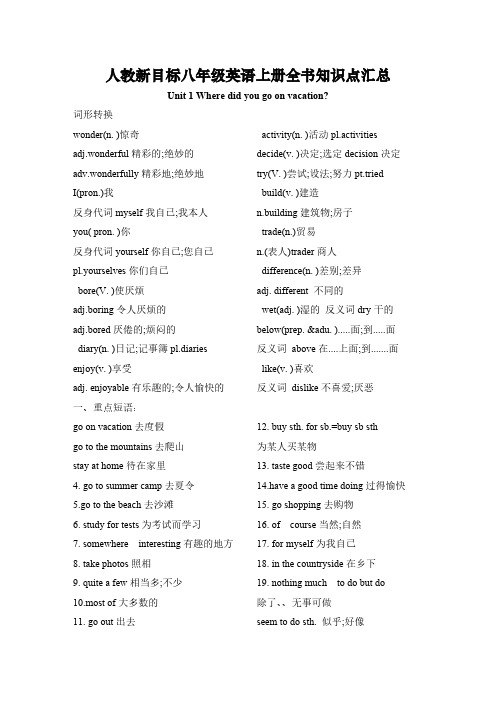
6. study for tests 为考试而学习
16. of course 当然;自然
7. somewhere interesting 有趣的地方 17. for myself 为我自己
8. take photos 照相
18. in the countryside 在乡下
9. quite a few 相当多;不少
arrive at 到达
33. one bowl of rice- 碗米饭
decide to do sth. 决定做某事
34. forget to do sth.忘记去做某
Make a decision to do sth
35. along the way 沿途;一路上
try paragliding 尝试滑翔伞运动
27. enjoy dk around the town 绕着小镇青
40. keep doing sth. 继续做某事
29.walk up to the top 走到顶部
41. up and down 上上下下
30. take the train 乘坐火车
diary(n. )日记;记事簿 pl.diaries
反义词 above 在....上面;到.......面
enjoy(v. )享受
like(v. )喜欢
adj. enjoyable 有乐趣的;令人愉快的
反义词 dislike 不喜爱;厌恶
一、重点短语:
go on vacation 去度假
12. buy sth. for sb.=buy sb sth
人教新目标八年级英语上册全书知识点汇总
Unit 1 Where did you go on vacation?
人教版初中英语八年级上册期中考试复习知识点汇总

人教版初中英语八年级上册期中考试复习知识点汇总Unit1 Where did you go on vacation?词组:•go on vacation去度假•stay at home待在家里•go to the mountains去爬山•go to the beach去海滩•visit museums 参观博物馆•go to summer camp去参观夏令营•quite a few相当多•study for为……而学习•go out出去•most of the time大部分时间•taste good尝起来很好吃•have a good time doing玩得高兴•of course当然feel like给……的感觉;感受到•go shopping去购物•in the past在过去•walk around四处走走•because of因为•drink tea喝茶•find out找出;查明•go on doing继续•take photos照相•something important重要的事•up and down上上下下•come up 出来•buy sth. for sb. / buy sb. sth.为某人买某物•taste + adj. 尝起来……•look + adj. 看起来……•do nothin g…but+动词原形除了…之外什么都没有•seem+(to be)+ adj. 看起来……•arrive in+大地点/ arrive at+小地点get to /reach到达某地•decide to do sth.决定去做某事•forget doing sth.忘记做过某事•forget to do sth.忘记做某事•start doing sth.开始做某事•stop doing sth. 停止做某事•dislike doing sth. 不喜欢做某事•keep doing sth.继续做某事•Why not do. sth.?为什么不做……呢?•So +adj. + that+从句如此……以至于……•tell sb. (not) to do sth. 告诉某人(不要)做某事•enjoy doing sth.喜欢做某事知识点•1. on vacation 度假on vacation = on holiday 意为“度假”•2. anything interesting 一些有趣的东西•1)something,anything,nothing,everything是指物的不定代词。
人教版八年级上册英语期中知识点梳理
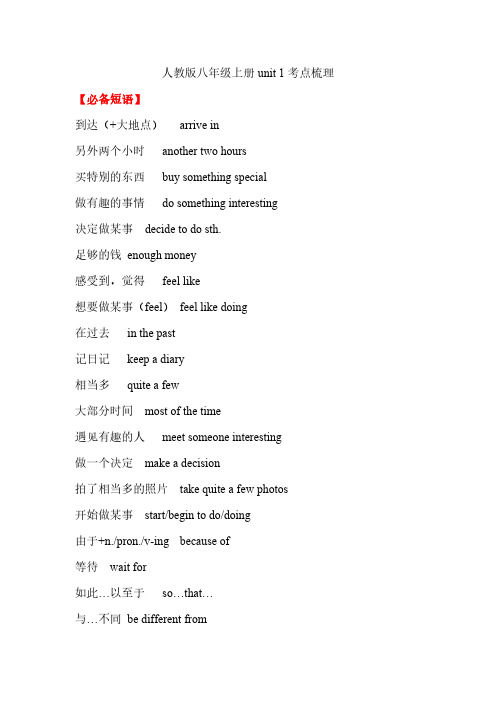
人教版八年级上册unit1考点梳理【必备短语】到达(+大地点)arrive in另外两个小时another two hours买特别的东西buy something special做有趣的事情do something interesting决定做某事decide to do sth.足够的钱enough money感受到,觉得feel like想要做某事(feel)feel like doing在过去in the past记日记keep a diary相当多quite a few大部分时间most of the time遇见有趣的人meet someone interesting做一个决定make a decision拍了相当多的照片take quite a few photos开始做某事start/begin to do/doing由于+n./pron./v-ing because of等待wait for如此…以至于so…that…与…不同be different from与…相同the same as尽力做某事try to do sth尝试做某事try doing sth尽某人最大努力做try one’s best to do sth.【教材考点梳理】【1】...go with anyone?(P.2)(1)anyone用作不定代词,意为“有人、任何人”,相当于anybody,用于疑问句和否定句中,在肯定句中用someone或者somebody。
但是anyone也可以用在肯定句中,表示“任何一个人”。
例句:Did you meet anyone friendly in that city?例句:Anyone can be helpful in some way.(2)anyone只能指人,不可以指物,后面不接of短语;(3)any one既可以指人也可以指物,后可接of短语。
例句:You can ask any one of us about this question.【2】Well,but the next day was not as good.(P.5)当我们要表示双方某方面(如年龄、身高等)程度相同或不同时,常用as…as或not as…as结构,表示“和……一样”或“和……不一样”。
人教版八年级上册英语期中复习:重点单词+重点短语+重点句型+情景交际+作文范文

人教版八年级上册英语期中复习:重点单词+重点短语+重点句型+情景交际+作文范文重点单词知识梳理:一、单词领读percent n. 百分之……point n. 得分;点mind n. 头脑;心智break v. (使)破;裂;碎;损坏writer n. 作者;作家laugh v. 笑;发笑n. 笑声almost adv. 几乎;差不多二、重点单词【单词复习】1. percent n. 百分之……【用法】也可写作per cent。
它没有复数形式,和数字搭配使用时放在数字后面。
【例句】The boy finished 30 percent of his homework last night.这个男孩昨天晚上完成了作业的百分之三十。
【拓展】当percent作主语时,谓语动词要根据其后所接名词的单复数来判断。
【例句】Twenty percent of the students are from China in his class.他所在的班中百分之二十的学生来自中国。
【考题链接】Sixty percent of the water in the lake __________________ clean and clear.A. areB. isC. wasD. were答案:B思路分析:因为主语water为不可数名词,故谓语动词用单数形式。
句意为“这湖中百分之六十的水是干净清洁的。
”表示现在的状况,故用一般现在时,B项正确。
2. mind n.头脑;心智【用法】作名词可构成短语:change one’s mind 改变主意;make up one’s mind 下决心。
【例句】I think nothing can change his mind. 我认为没什么可以改变他的主意。
【拓展】mind可作动词,意为“介意”,其后接名词、代词或动词的-ing形式;Would you minddoing something?意为“做某事你介意吗?”。
人教版八年级英语上册期中考试复习知识点汇总精选全文完整版

可编辑修改精选全文完整版人教版八年级英语上册期中考试复习知识点汇总本页仅作为文档页封面,使用时可以删除This document is for reference only-rar21year.March人教版八年级英语上册期中考试复习知识点汇总Unit1Where did you go on vacation?【重点单词】anyone ['eniwʌn] pron.任何人anywhere ['eniweə(r)] adv.任何地方 n.任何(一个)地方wonderful ['wʌndəfl] adj.精彩的;极好的few [fjuː]adj.很少的;n.少量most [məʊst] adj.最多的;大多数的something ['sʌmθɪŋ] pron.某事物nothing(=not…anything) ['nʌθɪŋ] pron.没有什么n.没有myself [maɪ'self] pron.我自己everyone ['evriwʌn] pron.每人;人人yourself [jɔː'self] pron.你自己;你亲自hen [hen] n.母鸡;雌禽bored [bɔːd] adj.无聊的;厌烦的;郁闷的pig n.猪diary ['daɪəri] n.日记;日记簿(keep a diary)seem [siːm] vi.似乎;好像someone ['sʌmwʌn] pron.某人;有人quite a few 相当多;不少(后接可数名词)of course [əvkɔːs] 当然activity [æk'tɪvəti] n.活动;活跃decide [dɪ'saɪd] v.决定;选定(decide to do sth.)try [traɪ] v.尝试;设法;努力(try to do sth. /try doing sth.)bird [bɜːd] n.鸟;禽paragliding ['pærəɡlaɪdɪŋ] n.空中滑翔跳伞bicycle ['baɪsɪkl] n.自行车building ['bɪldɪŋ] n.建筑物trader ['treɪdə(r)] n.商人;商船wonder ['wʌndə(r)] v.惊奇;想知道;怀疑difference ['dɪfrəns] n.差异;不同top [tɒp] n.顶部;顶wait [weɪt] v.等;等待(wait for)umbrella [ʌm'brelə] n.伞;雨伞wet [wet] adj.湿的;雨天的below [bɪ'ləʊ] prep.低于;在...下面 adv.在下面as [əz] conj.如同;像...一样enough [ɪ'nʌf] adj.足够的 adv.足够地;充分地duck [dʌk] n.鸭肉;鸭hungry(反full) ['hʌŋɡri] adj.饥饿的;渴望的feel like(doing sth.) 想要dislike [dɪs'laɪk] v.不喜欢;厌恶 n.不喜爱;厌恶;反感【重点短语】1. go on vacation 去度假2. stay at home 呆在家3. go to the mountains 上山/进山4. go to the beach 到海边去5. visit museums 参观博物馆6. go to the summer camp 去夏令营7. quite a few 相当多8. study for为…… 学习,9. go out 出去10. most of the time 大部分时间/绝大多数时间11. taste good 尝起来味道好12. have a good time 玩的开心13. of course 当然可以14. feel like 感觉像……/想要15. go shopping 去购物16. in the past 在过去17. walk around 绕……走18. too many 太多(可数名词前面)19. because of 因为20. one bowl of 一碗……21. find out 查出来/发现22. go on 继续23. take photos 照相24. something important 重要的事情25. up and down 上上下下26. come up 出来【重点句型】1. ——Where did you go on vacation 你到哪里去度假了——I went to New York City. 我去了纽约城。
人教版八年级上册期中复习:单元知识梳理
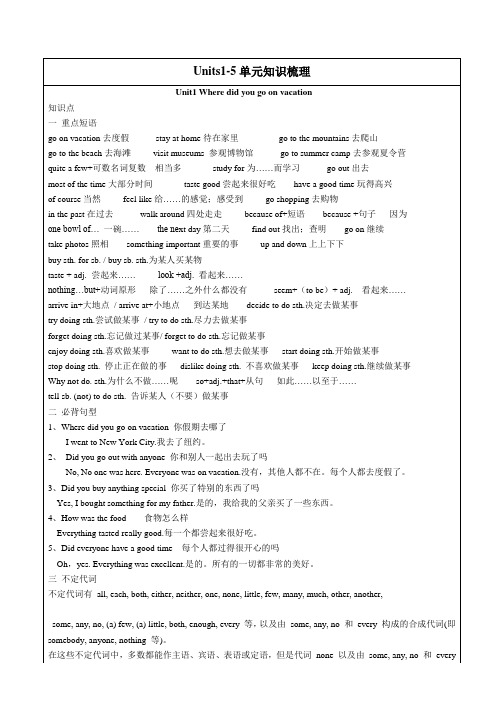
stop doing sth.停止正在做的事dislike doing sth.不喜欢做某事keep doing sth.继续做某事
Why not do. sth.为什么不做……呢so+adj.+that+从句如此……以至于……
1、复合不定代词:由some,any,no,every加上-body,-one,-thing构成的不定代词,叫做复合不定代词。
somebody = someone某人something某物,某事
anybody = anyone任何人anything什么事物,任何事物,无论什么事物
nobody = no one没有人,不重要的人nothing没有东西,什么也没有;不重要的人或事
Everything is made of elements.任何东西都是元素构成的。(作主语)
I have nothing to say toady.我今天没什么可讲的。(作宾语)
That`s nothing.没什么。(作表语)
(2)作主语时,谓语动词用单数。
(3)代替与-thing构成的复合不定代词,用it;代替与-body, -one构成的复合不定代词,一般用they,在正式文体中可用he。
十over介词,多于,超过,在…以上(表示数目、程度)= more than
My father is over 40 years old.
在…之上,与物体垂直且不接触,与under相反。There is a map over the blackboard.
超过:I hear the news over the radio.
人教版八年级英语上册期中考试作文复习及答案
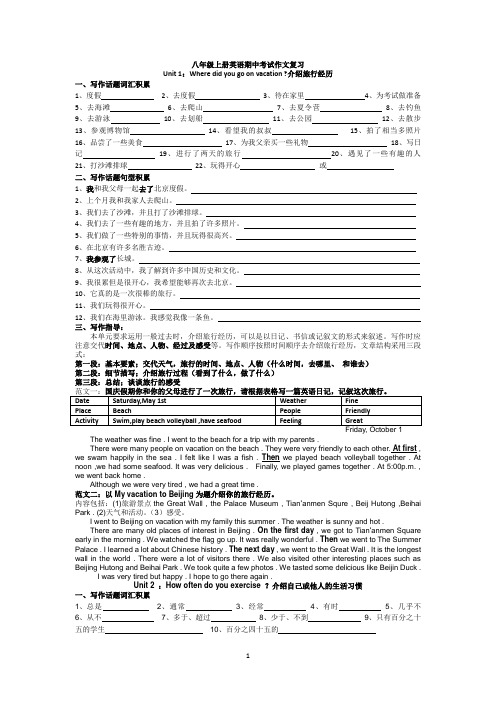
八年级上册英语期中考试作文复习Unit 1:Where did you go on vacation ?介绍旅行经历一、写作话题词汇积累1、度假2、去度假3、待在家里4、为考试做准备5、去海滩6、去爬山7、去夏令营8、去钓鱼9、去游泳10、去划船11、去公园12、去散步13、参观博物馆14、看望我的叔叔15、拍了相当多照片16、品尝了一些美食17、为我父亲买一些礼物18、写日记19、进行了两天的旅行20、遇见了一些有趣的人21、打沙滩排球22、玩得开心或二、写作话题句型积累1、我和我父母一起去了北京度假。
2、上个月我和我家人去爬山。
3、我们去了沙滩,并且打了沙滩排球。
4、我们去了一些有趣的地方,并且拍了许多照片。
5、我们做了一些特别的事情,并且玩得很高兴。
6、在北京有许多名胜古迹。
7、我参观了长城。
8、从这次活动中,我了解到许多中国历史和文化。
9、我很累但是很开心,我希望能够再次去北京。
10、它真的是一次很棒的旅行。
11、我们玩得很开心。
12、我们在海里游泳。
我感觉我像一条鱼。
三、写作指导:本单元要求运用一般过去时,介绍旅行经历,可以是以日记、书信或记叙文的形式来叙述。
写作时应注意交代时间、地点、人物、经过及感受等。
写作顺序按照时间顺序去介绍旅行经历,文章结构采用三段式:第一段:基本要素;交代天气,旅行的时间、地点、人物(什么时间,去哪里、和谁去)第二段:细节描写;介绍旅行过程(看到了什么,做了什么)第三段:总结;谈谈旅行的感受The weather was fine . I went to the beach for a trip with my parents .There were many people on vacation on the beach . They were very friendly to each other. At first , we swam happily in the sea . I felt like I was a fish . Then we played beach volleyball together . At noon ,we had some seafood. It was very delicious . Finally, we played games together . At 5:00p.m. , we went back home .Although we were very tired , we had a great time .范文二:以My vacation to Beijing为题介绍你的旅行经历。
八年级上册英语期中考知识要点人教版
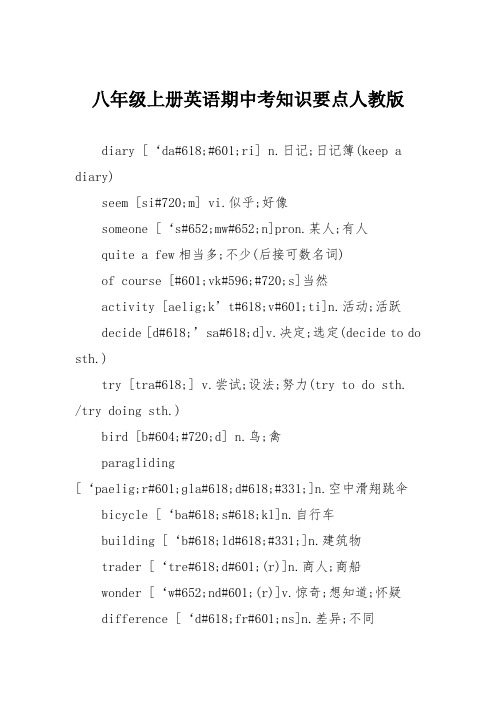
八年级上册英语期中考知识要点人教版diary [‘da#618;#601;ri] n.日记;日记簿(keep a diary)seem [si#720;m] vi.似乎;好像someone [‘s#652;mw#652;n]pron.某人;有人 quite a few相当多;不少(后接可数名词)of course [#601;vk#596;#720;s]当然activity [aelig;k’t#618;v#601;ti]n.活动;活跃 decide [d#618;’sa#618;d]v.决定;选定(decide to do sth.)try [tra#618;] v.尝试;设法;努力(try to do sth. /try doing sth.)bird [b#604;#720;d] n.鸟;禽paragliding[‘paelig;r#601;ɡla#618;d#618;#331;]n.空中滑翔跳伞bicycle [‘ba#618;s#618;kl]n.自行车building [‘b#618;ld#618;#331;]n.建筑物trader [‘tre#618;d#601;(r)]n.商人;商船wonder [‘w#652;nd#601;(r)]v.惊奇;想知道;怀疑difference [‘d#618;fr#601;ns]n.差异;不同top [t#594;p] n.顶部;顶wait [we#618;t] v.等;等待(wait for)umbrella [#652;m’brel#601;]n.伞;雨伞wet [wet] adj.湿的;雨天的below [b#618;’l#601;#650;]prep.低于;在...下面adv.在下面as [#601;z] conj.如同;像...一样enough [#618;’n#652;f]adj.足够的adv.足够地;充分地duck [d#652;k] n.鸭肉;鸭hungry(反full) [‘h#652;#331;ɡri] adj.饥饿的;渴望的feel like(doingsth.)想要dislike [d#618;s’la#618;k]v.不喜欢;厌恶n.不喜爱;厌恶;反感精品小编为大家提供的八年级上册英语期中考知识要点就到这里了,愿大家都能在学期努力,丰富自己,锻炼自己。
- 1、下载文档前请自行甄别文档内容的完整性,平台不提供额外的编辑、内容补充、找答案等附加服务。
- 2、"仅部分预览"的文档,不可在线预览部分如存在完整性等问题,可反馈申请退款(可完整预览的文档不适用该条件!)。
- 3、如文档侵犯您的权益,请联系客服反馈,我们会尽快为您处理(人工客服工作时间:9:00-18:30)。
人教版初中英语八年级上册期中考试复习知识点汇总Unit1 Where did you go on vacation词组:•—•go on vacation去度假•stay at home待在家里•go to the mountains去爬山•go to the beach去海滩•visit museums 参观博物馆•go to summer camp去参观夏令营•quite a few相当多•study for为……而学习•go out出去•most of the time大部分时间•taste good尝起来很好吃•have a good time doing玩得高兴•of course当然feel like给……的感觉;感受到•go shopping去购物•in the past在过去•walk around四处走走•because of因为•drink tea喝茶•find out找出;查明•go on doing继续•take photos照相•something important重要的事•up and down上上下下•come up 出来•buy sth. for sb. / buy sb. sth.为某人买某物•taste + adj. 尝起来……•look + adj. 看起来……•do nothing…but+动词原形除了…之外什么都没有•seem+(to be)+ adj. 看起来……•arrive in+大地点/ arrive at+小地点get to /reach到达某地•decide to do sth.决定去做某事•forget doing sth.忘记做过某事•forget to do sth.忘记做某事•start doing sth.开始做某事•stop doing sth. 停止做某事•dislike doing sth. 不喜欢做某事•keep doing sth.继续做某事•Why not do. sth.为什么不做……呢•So +adj. + that+从句如此……以至于……•tell sb. (not) to do sth. 告诉某人(不要)做某事•enjoy doing sth.喜欢做某事知识点•1. on vacation 度假on vacation = on holiday 意为“度假”•2. anything interesting 一些有趣的东西•1)something,anything,nothing,everything是指物的不定代词。
somebody,someone,anybody,anyone,nobody,everybody,everyone是指人的不定代词。
somewhere,anywhere,nowhere,everywhere是指地点的不定代词。
—Hi, Mark. I’m new here. Can you tell me about our school— Of course, Linda.A. somethingB. anythingC. everythingD. nothing•There isn’t ______ with your bicycle. you can ride homeA something wrongB anything wrongC wrong somethingD nothing wrong•2)当形容词修饰something, anything, nothing, everything等不定代词时,放在这些词的后面;There isn’t ______ with your bicycle. you can ride homeA something wrongB anything wrongC wrong somethingD nothing wrong•3)这些不定代词做主语时,谓语动词用第三人称单数。
如:•Is everybody here 大家都到齐了吗•something,somebody,someone,somewhere用于肯定句及表示请求或建议的疑问句中,而anything,anybody,anyone,anywhere用于否定句及疑问句中。
如:•Did you do anything interesting 你做了有趣的事吗(表疑问)•Why don’t you visit someone with me 你为什么不跟我一起去拜访下某个人呢(表建议)•3. 提建议的句子:•①What/ how about +doing sth. 如:What/ How about going shopping•②Why don’t you + do sth. 如:Why don’t you go shopping•③Why not + do sth. 如:Why not go shopping•④Let’s + do sth. 如:Let’s go shopping•⑤Shall we/ I + do sth. 如:Shall we/ I go shopping•4. long time no see 好久不见•5. quite a few 相当多6、a few 与a little 的区别,few 与little 的区别•⑴a few 一些修饰可数名词• a little 一些修饰不可数名词两者都表肯定意义如:He has a few friends. 他有一些朋友。
There is a little sugar in the bottle.在瓶子里有一些糖。
•⑵few 少数的修饰可数名词little 少数的修饰不可数名词但两者都表否定意义如:He has few friends. 他没有几个朋友。
There is little sugar in the bottle.在瓶子里没有多少糖。
There are ______ people, so it’s very crowded (拥挤的)A quite a fewB a lotC a littleD few•7. Still no one seemed to be bored. 仍然没有人感到烦闷。
•seem意为“好像;似乎;看来”,是个连系动词,构成的短语有:•seem to do sth. 好像做某事如:They seem to talk in class.他们似乎上课说话。
•seem(to be)+adj. 似乎......如:He seemed ( to be) ill yesterday.昨天他似乎病了。
•It seems that + 从句似乎......如It seems that he was ill yesterday. 昨天他似乎病了。
8、-ed及-ing的区别•相似但有区别词语:•interested adj. 感兴趣的interesting adj. 有趣的•surprised adj. 感到惊奇的surprising adj. 惊奇的•tired 累的tiring 令人疲惫的•excited 兴奋的exciting 令人兴奋/激动的•amazed 惊讶的amazing 令人惊讶的•worried 担忧的worrying 令人担心的•relaxed 放松的relaxing 令人放松的•bored 烦躁的boring 令人烦躁的•11. decide 意为“决定”,是动词。
它的名词形式为decision。
构成的短语有:decide to do sth.decide on doing sth. 决定做某事make a decision to do sth.•决定不要做某事,要用decide not to do sth.。
•如:Li Lei has decided to go to Beijing . 李雷已经决定去北京。
•It’s only 19:00. we decide ______ homeA goingB go toC not to goD not to go to•16. bring +地点,意为“带来”,其反义词是take。
如:•Please bring your book to our school. 请把你的书带到我们学校来。
•Please take your book to your school. 请把你的书带到你的学校去•足够形容词+enough 如:beautiful enough足够漂亮enough+名词如:enough food 足够食物enough to 足够…去做…如:I have enough money to go to Beijing.She is old enough to go to school. 她够大去读书了Anna is _____ to work out the problems.enough carefulC. carefully enoughD. enough carefully•18. so … that如此…以致于引导结果状语从句,so后面接形容词、副词. that 后面跟从句。
如:She was so sad that she couldn’t say a word. 她悲伤得一句话也说不出来。
•19. taste good 尝起来很好吃。
taste 系动词用法“尝起来”后+形容词。
其他表示状态的系动词有:feel (觉得)keep(保持)stay(保持)seem(好像)look(看来像……)smell(闻起来)sound(听起来……)taste(尝起来……)•系动词与形容词连用•The weather stays very hot。
天气非常热。
He seems very clever。
他好像很聪明。
•Jim looks like his father吉姆长得像他父亲。
The fish smells terrible. 这鱼闻起来坏了。
•That sounds a good idea。
那听起来是个好主意。
The soup tastes very delicious。
这汤尝起来非常香。
•I feel sick。
我感到难受。
Keep quiet,please!请安静下来!The cookies ________ good. Can I have some moreA. tasteB. smellC. feelD. sound语法一般过去时•1)在确定的过去时间里所发生的动作或存在的状态。
例如:时间状语有:yesterday, last week, an hour ago, the other day, in 1982等。
